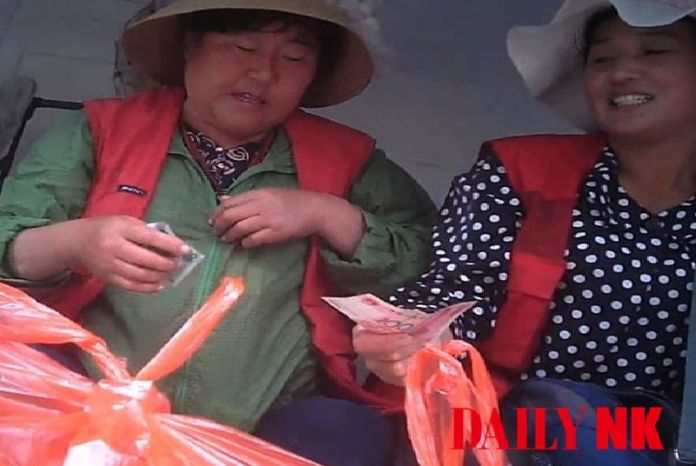
Under the pretext of eradicating anti-socialist elements, North Korea’s authorities are cracking down on market activity. In reaction, some residents have openly protested the country’s state security officers.
“There was an assessment at the beginning of the month regarding the broad inspections conducted to uncover anti-socialist elements in downtown Hyesan City [located near the border with China]. Residents responded by complaining at the meeting, opposing the censorship in an organized fashion because the order was not being applied equally, and was not carried out very well overall,” a source in Ryanggang Province told Daily NK on June 29.
“Residents were saying, ‘Some houses were searched very lightly, while over 10,000 RMB (~1,500 USD) in cash was taken from others.’ ‘Some people were subject to the crackdown, while others were able to evade it.’ People were openly complaining, ‘If you’re going to steal money, take it from everyone equally!’”
“Those who were out of their homes during the crackdown no doubt got the tip off from the Ministry of State Security (political police). As the crackdown approached, they prepared by taking out all the money and products from their homes and disappeared without a trace. Why did those people get special treatment while the rest of us got hit by a bolt of lightning?” she added.
Crackdowns on the marketplace have eased since the beginning of the Kim Jong Un era, leading to a surge in market activity. However, there have been intermittent measures introduced and implemented by the authorities to stunt and stifle these developments. But North Korea’s residents, taking heed from the regime’s propaganda advising them to “pick themselves up by their own bootstraps,” have come to regard commercial activity as an inherent right.
There have been many confrontations with officials from the Ministry of People’s Security (police) in this regard. However, Ministry of State Security officials, tasked with handling the ideological control of the people, were once regarded as “angels of death,” before the marketization period. But now even their power has been sapped by the changing structure of North Korean society, specifically the shifting values brought on by marketization.
“The residents were busy complaining to the Ministry of State Security agents at the crackdown assessment, saying, ‘What power do we have?’ Facing this pressure from the residents, the investigating agents declined to taken intervening measures and instead hurriedly left the room,” a separate source in Ryanggang Province noted.
Many are also upset because Ministry of State Security agents are well known to accept bribes from market traders. As levels of mistrust and anger increase, the situation is reportedly deteriorating.
Asked to describe the current atmosphere, a third Ryanggang-based source said, “Previously, when there was a crackdown coming, people would let each other know. This time, people are warning each other but also accusing each other. Making a living is difficult, and the authorities do nothing but launch investigations and confiscate money, so the people are lashing out.”
The residents are also upset about the regime’s propaganda and the fact that punishments are not being meted out evenly.
“It’s said that all the money and property seized during the investigations is being sent for construction projects in Samjiyon County, but nobody actually believes that. The Ministry of People’s Security conducted ideological evaluations of the residents after the investigation, but the residents are powerless to resist,” the initial source concluded.
North Korea proclaimed that it would launch a war of annihilation against anti-socialist behavior this year, and has strengthened its crackdown on the trade of South Korean cultural content and products that reflect capitalist culture.




















